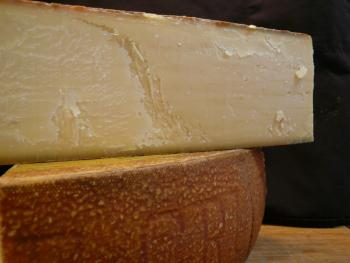Gruyère (Switzerland)
- Producer
- Various
- Country
- Switzerland
- Region
- Bulle, Fribourg & Jura
- Size
- 24 ins diameter, 4 ins high
- Weight
- 80-88lbs
- Website
- Milk
- Cow
- Classification
- Firm
- Rennet
- Animal
- Rind
- Natural

One of Switzerland's best known and loved cheeses, Gruyère is mainly produced by local co-ops and dairies in the western, French speaking area of Switzerland.
Milk for production comes from the Fribourgois cows that are owned by the co-operative dairies. There are strict rules surrounding the animals' diet because of the effect it has on the milk, and therefore cheese production.
Milk is usually delivered twice daily from farms within a 12 mile radius. Although evening milk is held overnight and milk from the second milking is sometimes skimmed, all milk must be less than 18 hours old at the start of cheesemaking.
Cheeses are made using cultured, raw cow's milk and production typically occurs in an open copper vat.
Rennet is added at 87°F and coagulation lasts between 30 and 50 minutes. After cutting, the curds are re-heated to about 131°F for 40-45 minutes before being put into molds, where they are pressed with 600-1900lbs. of pressure for about 20 hours.
After pressing, cheeses are brined and placed on spruce shelves in the maturing cellar at a temperature of about 55°F with a relative humidity of about 92%. For the first 8-12 days the cheeses are salted, rubbed and turned daily. Cheeses are then matured for a minimum of five months.
Ideally, maturation should last 12-16 months, during which time the cheeses are washed regularly with a brine solution and have the opportunity to reach their full potential.
With an interior paste the color of butterscotch, the texture of a well matured Gruyère is firm and dense and slightly flaky, frequently studded with small, crunchy granules that are crystalized amino acids.
Flavors are a complex balance of sweetness and salt that should dissipate, revealing a nutty, caramel taste with notes of mushrooms, hay and earth and fruit.



